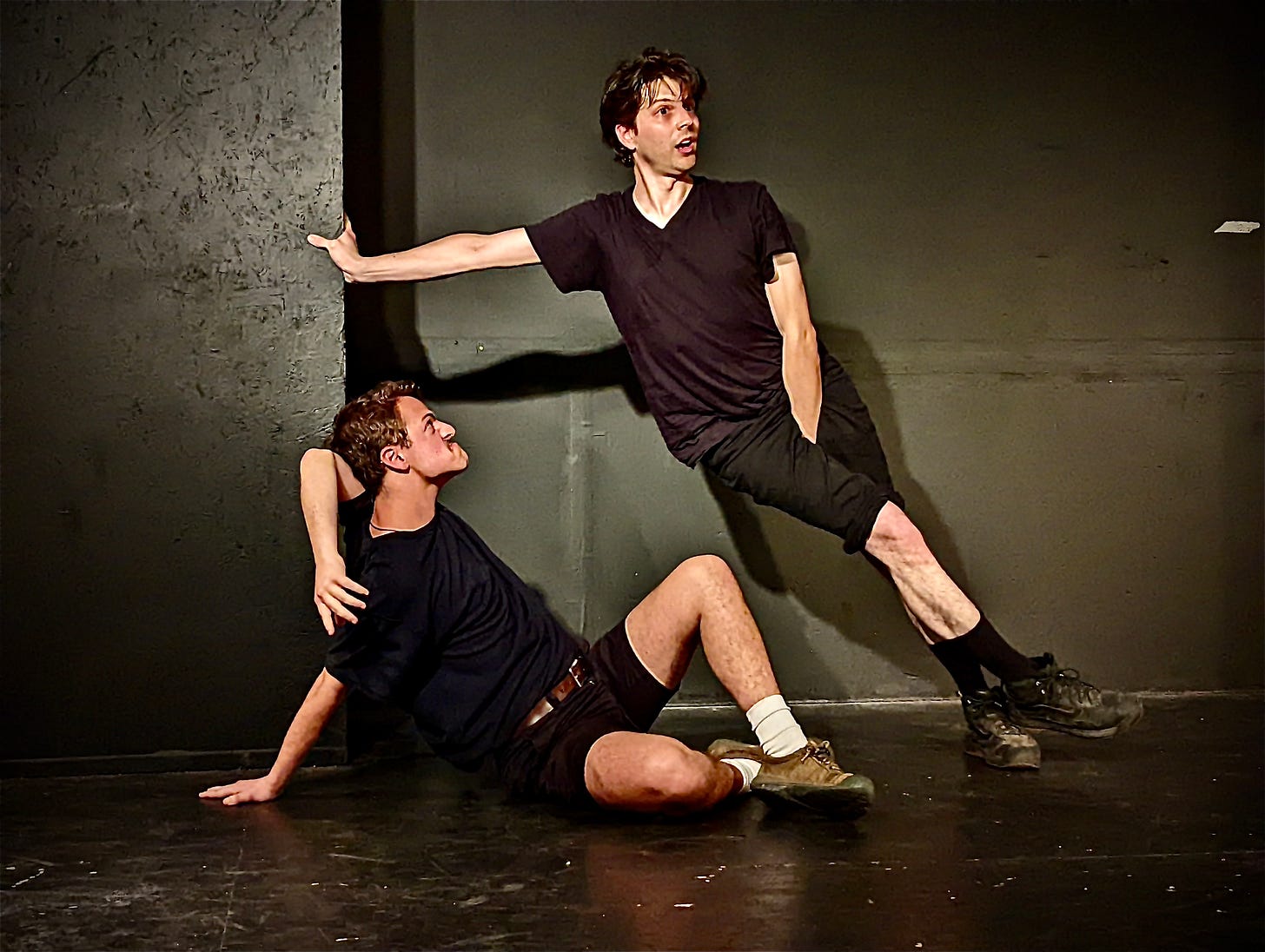Hey, clowns.
A quick thank you to all of you who’ve spread the word about this blog. We’ve had a great increase in readership over the last month.
I’ve received a lot of positive feedback on my blogs that offer step-by-step instruction. So I decided to write this week about how to maximize your experience in clown class. Once I started, I realized this advice also translates well for shows.
As always, curious for your thoughts and observations.
ENTER CLASS WITH GOOD INTENTIONS
You can’t simply shut off your worries because you’ve signed up for a clown class.
But your mental state does affect your overall experience. Focus on what you can control. Get a good night’s sleep. Hydrate and eat in whatever way makes you feel energized. I like cold showers for a quick endorphin boost. Dress in comfortable clothes. Wear good shoes. Bring extra hair ties if you need them, a bottle of water and snacks if you tend to get hungry and/or irritable.
Be mindful of your commute. Listen to music or podcasts. Enjoy a silent drive or bike ride. Avoid texts, emails, social media and calls that might drag you back to reality. Don’t fall into the trap of overthinking. Class isn’t a puzzle to solve. It’s an experiment in joy and spontaneity. When you pre-plan ideas, you prevent yourself from trusting your shamelessness and desperation.
Show up early. Familiarize yourself with the space. Stretch. Begin to practice presence. Make eye contact with your classmates. You don’t have to engage in small talk. Just be warm, welcoming and optimistic. This is not just a class of your peers; it’s the audience you have to charm to succeed.
STAY CONNECTED
Once class begins, pay attention to when you start to withdraw. It usually happens as soon as the instructor speaks. This is born from good intentions. You want to do a good job, so you retreat to your brain. But while this type of behavior is perfectly acceptable in a work zoom, it’s a bad look for a clown.
Practice listening while still staying connected to your surroundings. Look around at your classmate’s reactions. Be present in your body. Maintain a state of readiness. You never know when a moment might arise where you can flex your joy and steal the spotlight. A good clown possesses an opportunistic mindset.
You might experience intrusive thoughts. Don’t try to shut them off. That’s a sure way to amplify their signal. Let them enter and exit like the tide. Instead, focus harder on what’s happening in the moment. When we play games that excite us, other distractions will naturally fall away.
Watch closely when your classmates are performing. There are two reasons this is important. This is another natural opportunity to check out. The instructor isn’t watching and we’re comfortable in our seats. We spend our lives indulging distractions at times like this. We withdraw to rest and collect ourselves.
When we clown, even a brief disconnection can sever our bond with the crowd. To them, a momentary lapse can read like boredom or disinterest. Stay in the game. That’s how you build your endurance for continuous play.
The second reason is that observing exercises is where we learn the most. In early classes, you’ll be so adrenalized that your time on-stage will be a blur. You will get notes, but often be unable to connect them to your actions. You will pick up more insights by watching others and seeing how they succeed, fail and adapt to adversity.
GENUINELY TRY
A lot of funny people take clown classes. They know how to get laughs, hold court and be the center of attention. Sometimes, these skills make them instant all-stars.
But it’s just as common for them to flop hard.
Clown funny isn’t the same as everyday funny. An audience doesn’t like when a clown is more interested in getting laughs than being loved. They don’t want to see performers use jokes and silly behavior to control a narrative and mask their true feelings. Why should the audience dare be vulnerable if the performer is unwilling to take any real risk themselves?
Subversion is a major component of clown. When I teach, students can try any tactics they like. If they get a laugh by breaking my rules, good for them. But it’s rare for a clown to succeed with a pre-planned bit. Especially in an intro class. Their fellow students usually feel cheated – since they’ve gone out and died on their shields.
Being rebellious, in this case, seems safer and less genuine.
Our impulse to subvert is often rooted in a fear of being disliked. Learn to distinguish your anxious voices from the ones that want you to dig deeper and get messy. See what happens when you make an honest effort to succeed. Embrace the moments of laughter that come when you’re trying your best, instead of trying to be funny.
That’s it for this week!
Let me know what you think – all feedback is welcome.
OTHER CLOWN BUSINESS!
LISTEN TO STAND UP AND CLOWN (THE PODCAST) I just posted a great interview with veteran improviser ANDEL SUDIK. There’s a great archive of old interviews with people who use clown elements in their work – along with solo pods where I discuss my philosophies surrounding the work.
APPLE PODCASTS: shorturl.at/DFKR5
SPOTIFY: shorturl.at/HPQ18
THE FINAL STAND UP AND CLOWN (THE SHOW) of 2023 takes place on Monday, December 18th, 930pm at The Elysian Theater. As of publication, stand-up comics Dana Gould, Irene Tu, Luke Null, Matt McCarthy will be entering the clown Thunderdome.
12/18: https://tinyurl.com/mr3nbu9r
ALSO CHECK OUT MY LINKTREE: https://linktr.ee/chad.damiani
AND FOLLOW ME @THECHADDAMIANI ON IG!





That last pair of clowns are reallllly trying